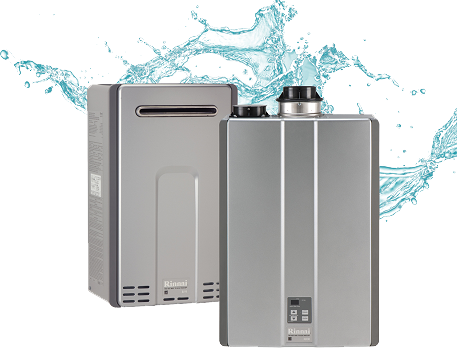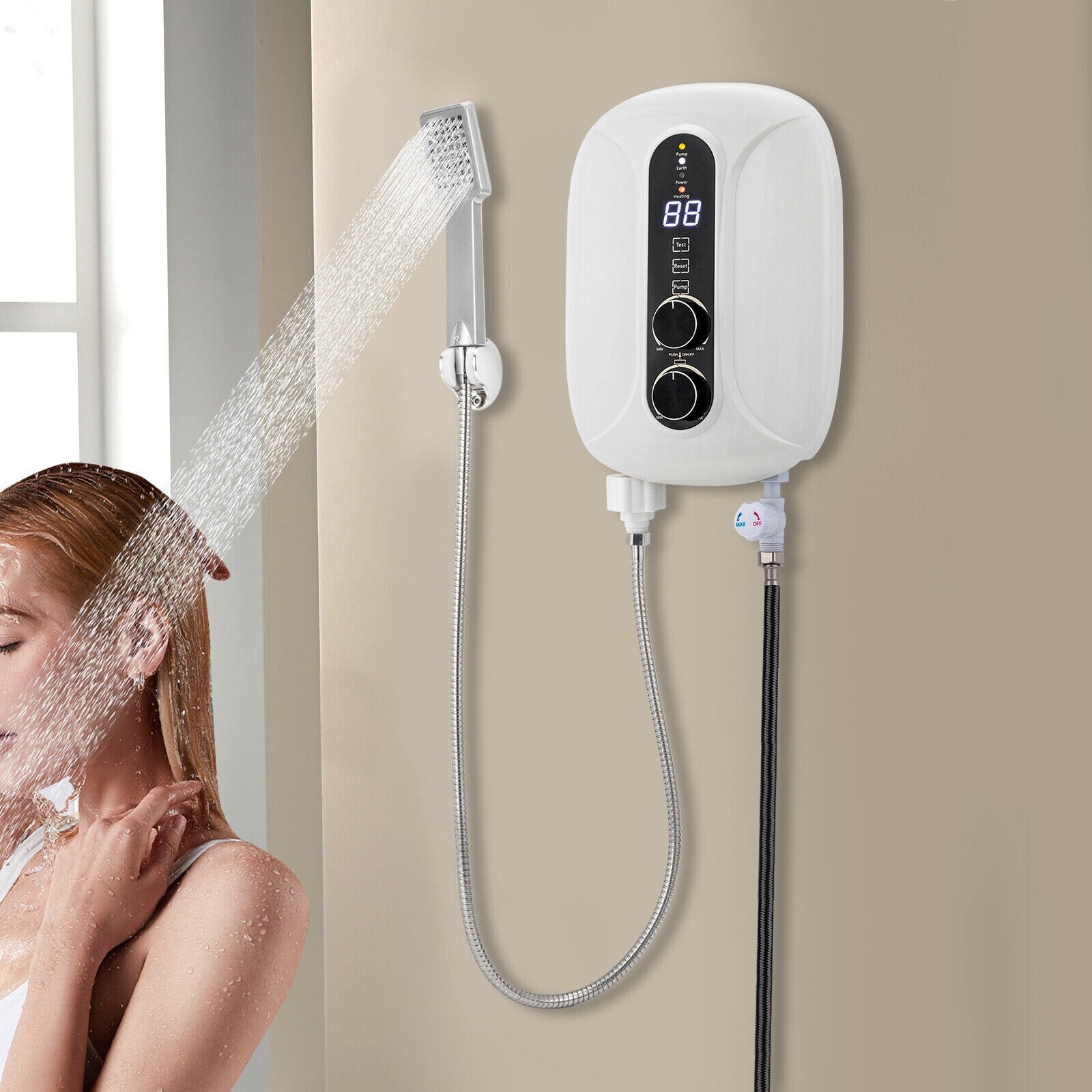Best Reasons Why Tankless Water Heaters Prove Beneficial
Best Reasons Why Tankless Water Heaters Prove Beneficial
Blog Article
They are making a number of good observations related to Six Benefits of a Tankless Hot Water Heater as a whole in this great article on the next paragraphs.

In a world where convenience and efficiency preponderate, it's not a surprise that house owners are continuously in search of smarter ways to handle their home's energy usage and convenience. One development that has actually steadily acquired popularity is the tankless water heater. But what exactly makes these systems stand apart from the conventional tank-based designs most of us grew up with? Allow's dive in and check out the advantages of tankless hot water heater, helping you determine if it's time to make the button in your house.
Introduction
Image this: you enter the shower after a lengthy day, anticipating a soothing cascade of warm water, only to be welcomed by icy droplets because the last individual used all of it up. Audio familiar? Typical water heaters save a fixed quantity of hot water, indicating you go to the mercy of that storage tank's supply. Tankless systems, on the other hand, heat water as needed. Say goodbye to running out mid-shower, no more fumbling with routines simply to make certain warm water is available.
Comprehending Tankless Water Heaters
What Are Tankless Water Heaters?
Tankless water heaters, often referred to as on-demand or instantaneous hot water heater, offer warm water just as it's required. Rather than saving gallons of pre-heated water, these systems kick into action the minute you turn on the faucet. Water goes through a warm exchanger, heating up in real-time, implying you get a nonstop circulation of hot water without the demand for a big tank resting lazily by.
Exactly how Do They Differ from Typical Solutions?
Standard heaters hold a tank of warm water, making use of energy to maintain that storage tank at a regular temperature. Tankless devices get rid of the standing supply, reducing squandered power and the bulky footprint of a big cylinder. Essentially, you're upgrading from a "stockpile" attitude to a "made-to-order" strategy.
Usual Kinds Of Tankless Devices
Tankless water heaters normally are available in two selections: gas and electric. Gas models often tend to supply greater circulation prices, perfect for bigger homes, while electrical designs usually offer smaller homes and are usually simpler to mount. Furthermore, some systems are made for point-of-use (serving one fixture) while others can deal with the entire home's hot water requirements.
Secret Benefits of Tankless Water Heaters
1. Limitless Hot Water Supply
Ever before needed to arrange showers so everyone gets their reasonable share of hot water? With tankless, that becomes a distant memory. As long as the heater's flow ability isn't exceeded, you can take back-to-back showers without developing into a popsicle.
2. Energy Effectiveness and Price Savings
No more heating a giant storage tank's well worth of water and maintaining it warm all the time. Tankless heating systems lower standby power losses, which can decrease energy bills. While the initial cost might be greater, the lasting savings typically warrant the financial investment.
3. Space-Saving Design
If your home is short on storage space, getting rid of the large container liberates useful area. Tankless devices are small and can often be placed on walls, hidden in corners, or installed in limited utility storage rooms without hogging the entire area.
4. Longer Life expectancy
A well-maintained tankless hot water heater can outlive its tank-based relative. Conventional containers could last 10-15 years, while tankless models can maintain chugging along for twenty years or even more, making them a strong investment in time.
5. Improved Water High Quality
Keeping water in a container can sometimes lead to sediment buildup or a somewhat "off" preference. With tankless systems, fresh water is warmed right away, reducing the chances of sediment buildup and possibly offering cleaner-tasting water.
Factors to consider Before Switching
Though the benefits are compelling, it's a good idea to think about a few factors before completely dedicating.
First Investment Costs
Tankless heating units commonly come with a greater ahead of time cost. In between the system itself and prospective setup alterations, the preliminary expense might give you sticker label shock. But keep in mind to watch it as a long-term investment.
Setup Requirements
Relying on your home's infrastructure, you may need additional electrical ability or gas line upgrades. Ensure you recognize the setup needs and seek advice from an expert to stay clear of shocks.
Examining Your Home's Water Usage Patterns
If your family at the same time makes use of multiple components with high hot water demand, make certain the device's flow price fulfills your needs. Understanding your use patterns helps you pick the ideal dimension and sort of tankless heater.
Maintenance and Care Tips
Tankless systems are reasonably reduced upkeep, however they aren't set-it-and-forget-it home appliances.
Regular Cleansing and Descaling
Difficult water minerals can build up in the heat exchanger, affecting performance. Routine descaling (typically recommended yearly) keeps the unit running at peak performance.
Yearly Specialist Assessments
A yearly checkup from an expert guarantees minor concerns are caught early. They'll examine the unit's efficiency, try to find leaks, and assist maintain optimal performance.
Guaranteeing Correct Ventilation
For gas designs, correct ventilation is vital to safely get rid of exhaust gases. Make sure airing vent systems are clean and correctly set up to stop any potential safety and security dangers.
Comparing Different Brands and Versions
Not all tankless hot water heater are created equal.
Researching Trusted Producers
Search for trusted brand names with a history of generating top quality devices. A reliable manufacturer frequently provides better consumer support and longer warranties.
Reviewing Evaluations and Customer Comments
User testimonials and comments from next-door neighbors or friends that have gone tankless can use important understandings. Often, real-life experiences can be a lot more telling than advertising brochures.
Setup: Do It Yourself or Expert?
While some homeowners relish tackling projects themselves, tankless setup could not be the best time to burst out the tool kit.
Benefits and drawbacks of DIY Installation
A do it yourself mount could conserve money, but it includes dangers. Incorrect setup can bring about inadequacy or safety and security problems. If you're handy and have experience, it may be possible-- but wage caution.
When to Call a Specialist Plumber
For a lot of, calling a pro makes certain whatever's done properly. A specialist plumbing technician understands regional codes, sizing needs, and airing vent specifications, reducing the danger of problems.
Optimizing Performance
You've purchased a tankless device-- currently optimize its effectiveness.
Optimal Temperature Settings
Most individuals establish their devices in between 120-140 F. Changing the temperature level can boost convenience and savings. Experiment to locate a pleasant area that doesn't squander energy.
Coupling With Low-Flow Fixtures
Intend to extend your unit's capacities? Take into consideration setting up low-flow showerheads and faucets. They lower water use, enabling your tankless system to deliver a constant stream of hot water without stressing.
Environmental Effect
Tankless water heaters line up with greener living goals.
Lowered Carbon Footprint
By using much less power and only home heating water as needed, tankless systems can reduce your home's carbon impact, minimizing your ecological impact.
Conserving Natural Resources
Less power usage and much less lost warm water translate into fewer natural deposits being used, an environmental win-win.
That Profits Most from Tankless Heating units?
The beauty of tankless heating units is that they can fit a range of houses.
Large Families vs. Single Residents
Large families might love the unlimited hot water supply, while solitary owners value the energy financial savings from not heating up an entire storage tank for just someone's early morning shower.
Home Owners with Restricted Space
If your home is short on square video, losing the bulky container liberates space for other essentials-- or possibly simply more breathing space.
Eco-Conscious Consumers
Going tankless aligns with eco-friendly worths, ensuring you're not losing energy or sources.
Future Patterns in Tankless Water Heaters
The world of home appliances is ever-evolving, and tankless hot water heater are no exception.
Smart Home Assimilation
Envision readjusting your water heater's temperature by means of an application or obtaining upkeep informs on your phone. As clever home technology advancements, we'll see more connectivity and comfort.
Innovations in Modern technology
R&D is constantly improving warmth exchangers, making devices extra efficient and resilient. Future models could be also quieter, a lot more small, and better matched for differing climates.
Verdict
Selecting a tankless water heater is greater than simply upgrading your home's warm water system; it's buying long-term convenience, power effectiveness, and a greener way of living. By considering your home's water use, bearing in mind setup demands, and dedicating to routine upkeep, you can enjoy a stable stream of warm water without the baggage of a cumbersome container. As innovation advances, you can eagerly anticipate even smarter, extra efficient tankless remedies that not only make your life much easier yet additionally profit the planet.
Six Benefits of a Tankless Hot Water Heater
Continuous hot water. Large families know what a pain it is to hop into the shower and get blasted with cold water. With a tankless hot water heater, this doesn't happen as long as you install the right size tank. Even if you don t have a large family, a tankless hot water heater allows you to use multiple appliances at once without running out of hot water. Reduced energy bill. Because tankless heaters are essentially "off" when the water tap is not on, they use less energy overall. In fact, an ENERGY STAR-qualified tankless hot water heater can use 25-40% less energy than a conventional water heater, and save the average family $100 or more annually. Longer life. Get more bang for your buck with a greater lifespan. Specifically, conventional hot water heaters last about 10-13 years compared with up to 20 years for a tankless hot water heater. Less space. Did you know that tankless hot water heaters can be hung on a wall almost anywhere in your home? Plus, at 28" tall by 20" wide and 10" deep, a tankless hot water heater takes up a lot less space than a conventional hot water heater, which is 60" tall and 24" wide. Good for the environment. In addition to reducing the amount of energy used, most propane-fired tankless water heaters are made of recycled materials. Many conventional tanks, on the other hand, go directly to the dump once they've served their purpose. High safety ratings. Conventional water heaters are "always on" and thus pose safety risks more often than do tankless heaters, which only operate when warm water is needed. https://www.rotorooter.com/blog/water-heaters/six-benefits-of-a-tankless-hot-water-heater/

Do you really like more info about Pros and Cons of Tankless Water Heater? Try to leave a short review directly below. We'd be glad to find out your thoughts about this blog post. We are looking forward that you visit us again in the future. Loved our piece of writing? Please quickly share it. Help another person find it. Kudos for being here. Please visit our website back soon.
Call Today Report this page